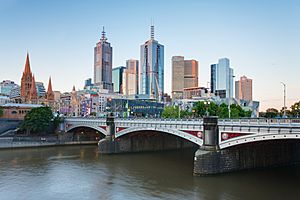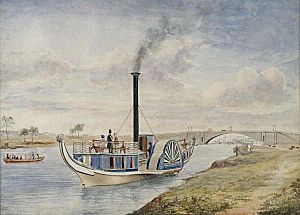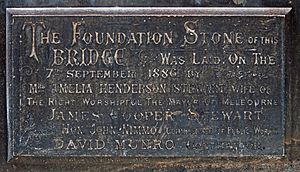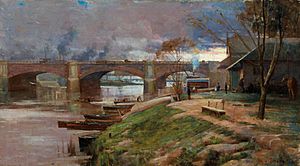Princes Bridge facts for kids
Quick facts for kids Princes Bridge |
|
|---|---|

Princes Bridge looking towards Melbourne CBD, Federation Square, St Paul's Cathedral and partially Flinders Street station, December 2007.
|
|
| Coordinates | 37°49′09″S 144°58′06″E / 37.8192°S 144.9682°E |
| Carries | Trams, road vehicles, pedestrians, cyclists |
| Crosses | Yarra River |
| Locale | Melbourne CBD, Australia |
| Official name | Princes Bridge |
| Characteristics | |
| Design | Arch bridge |
| Total length | 120 metres (400 ft) |
| Width | 30 metres (99 ft) |
| History | |
| Designer | John Grainger |
| Construction begin | 1886 |
| Opened | 4 October 1888 |
Princes Bridge is a famous bridge in central Melbourne, Australia. It crosses the Yarra River. This bridge is built where people have crossed the river for a very long time. It acts like a main entrance to the city center from the south.
It connects Swanston Street on the north side of the Yarra River to St Kilda Road on the south side. Cars, trams, and people all use it. The bridge you see today was built in 1888. It's so important that it's listed on the Victorian Heritage Register.
Because of where it is, Princes Bridge is often a key spot for big celebrations in Melbourne. These include the Moomba Festival, New Year's Eve, and many events on the Yarra River.
Contents
The Story of Princes Bridge

First River Crossings
When the first European settlers arrived in Melbourne in 1835, there was no permanent way to cross the Yarra River. People used punts and ferries to get across. The government in Sydney was slow to give money for a bridge. So, private companies often built Melbourne's early structures.
In 1840, a private company was formed to build a bridge. Traders in different streets wanted the bridge to bring traffic to their area. In 1844, a wooden bridge was built. It was a toll bridge, meaning you had to pay to cross. People called it Balbirnies Bridge. This simple wooden bridge was used for about five years.
Second Bridge: A Stone Arch
A new, stronger bridge was planned, and its first stone was laid in 1846. This second bridge opened on November 15, 1850. Its opening was part of big celebrations. These celebrated Victoria becoming a separate colony from New South Wales.
This bridge was a single arch made of bluestone and granite. It was 46 meters (150 feet) long. When it was built, it was one of the longest and flattest stone arch bridges in the world! The government paid for it, and David Lennox designed it. At the opening, it was named "Prince's Bridge" to honor Albert, Prince of Wales.
The Current Bridge: Built in 1888
Soon after the second bridge opened, gold was found in Victoria. Melbourne's population grew very fast. More people meant more traffic on the bridge. The Yarra River also needed to be wider for more ships.
By the late 1870s, people decided to replace the 1850 bridge. A design competition was held in 1879. John Harry Grainger, an architect and engineer, won the competition. He designed the bridge we see today. (He was also the father of the famous composer Percy Grainger.)
Building the new bridge took time. The old bridge was taken apart in 1884. Its stones were carefully saved to be used again. The new bridge's foundation stone was laid on September 7, 1886.
The current Princes Bridge officially opened on October 4, 1888. This was just in time for a big International Exhibition in Melbourne. Like many old Melbourne buildings, it's built with strong bluestone and concrete.
In 1924, the bridge was made even stronger. This was to support the heavier electric trams that replaced the old cable trams. Today, the bridge's name is written as Princes Bridge, without an apostrophe.
For a long time, the bridge had two lanes for cars and a tram lane in each direction. It also had wide footpaths for people and bikes. Around 2013, the bike lanes moved to the road. This reduced the car lanes to one in each direction.
How People Use the Bridge
Many people walk across Princes Bridge every day. It's also used by cars, trams, buses, and bicycles. Sometimes you might even see a horse-drawn carriage for tourists! Many commuters park near the Melbourne Arts Precinct on the Southbank side and walk to work in the CBD.
Bridge Design and Features
Princes Bridge is 30 meters (99 feet) wide and 120 meters (400 feet) long. It has three arch spans made of iron girders. These are supported by strong bluestone piers. The bridge also features fancy half-columns made of Harcourt granite.
You can see coats of arms on the bridge. These belong to the local councils that helped pay for its construction. The bridge also has a detailed railing along the top and special lamps on each pier.
The design of Princes Bridge looks a lot like the Blackfriars Bridge over the River Thames in London. People noticed this similarity when Princes Bridge first opened. Princes Bridge is wider than Blackfriars Bridge, but it has fewer and shorter spans. Both bridges are great examples of late 19th-century Arch bridge design.
The bridge was cleaned up and repaired before the 2006 Commonwealth Games.
Gallery
-
Princes Bridge and the Melbourne CBD from the Yarra River
See also
- Crossings of the Yarra River
 | Janet Taylor Pickett |
 | Synthia Saint James |
 | Howardena Pindell |
 | Faith Ringgold |







